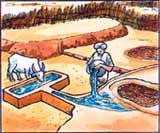Of course, the Director General is the Chief Executive Officer of the United Nations Educational, Scientific and Cultural Organization, responsible to its General Conference and Executive Board for the conduct of the programs of the Organization. He leads an organization with some 2000 staff members spread over some 58 nations, which has a budget in excess of US$500 million. The designers of the organization, recognizing the complexity of the governance pf UNESCO, created the post of Director General with a considerable amount of authority and independence.
I believe however that this traditionalist view of UNESCO and its Director General tells only a part of the story. UNESCO is especially important in its roles of convening people and organizations to work together. Thus it reaches out to the global education, science and cultural communities through a network of National Commissions in each of its member states. The U.S. National Commission, for example, has 100 members, most of whom in turn represent important educational, scientific or cultural organizations within the United States. UNESCO links educators worldwide in leading the Education for All program. Its intergovernmental scientific organizations link scientists worldwide in areas such as oceanography and geology. It has convened networks of nearly 900 world heritage sites, hundreds of bioreserves, thousands of UNESCO clubs, thousands of UNESCO associated schools, as well as a large network of university chairs. The Director General stimulates and encourages the work of these networks, of course often working through his staff and offices reporting to him.
UNESCO, created in the aftermath of World War II, states in its constitution that since wars are created in the minds of men, it is in the minds of men that we must begin to build the defenses of peace. UNESCO's mission is thus to build those defenses. One of my friends has called UNESCO the conscience of the United Nations system. The Director General has singular moral authority to encourage the development of a culture of peace and a dialog among nations. He regularly denounces violence against reporters and abuses of freedom of the press.
The first Director General was Julian Huxley, scion of the famous Huxley family and a world famous scientist in his own right. He was followed by Luther Evans, a historian who had been the Librarian of Congress, world's largest library and certainly its most influential library at the aftermath of World War II. These men, with their successors by their examples endowed the Director General of UNESCO with great moral authority, especially in matters of education, science, culture and communications.
Rather than try to say what is "expected of" the new Director General, I would say that was is hoped for from the man is:
- leadership in advancing the mission of UNESCO
- to be a strong and credible spokesperson for education, science, culture, communications, and peace
- to effectively promote intercultural understanding and respect for cultural diversity
- continued progress in improving the operation of the staff of the organization, as well as leadership in developing and allocating resources, and managing UNESCO's programs
- promoting and leadership in coordinating the global efforts of the networks inspired by and linking to UNESCO.






















